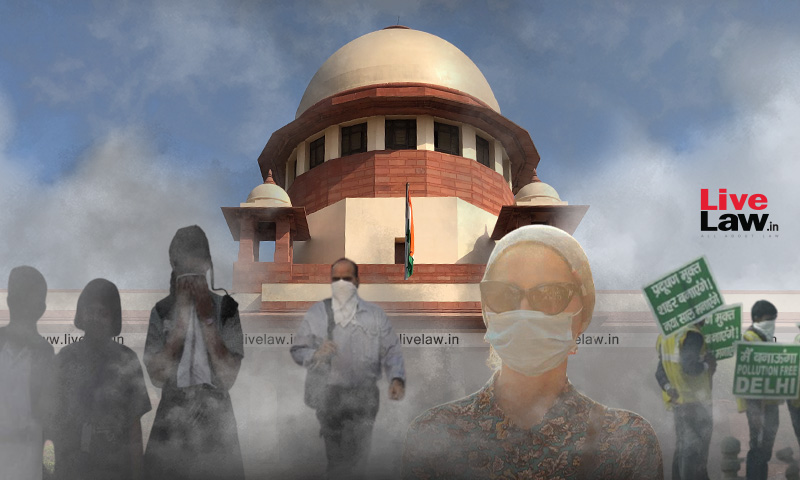 |
|
The Supreme Court of India has issued a stern directive concerning the alarmingly deteriorating air quality in Delhi and the National Capital Region (NCR). The court's intervention, prompted by the severe air pollution crisis, underscores the urgent need for comprehensive and immediate action to mitigate the health risks posed by the hazardous air quality. The deteriorating conditions have reached a critical point, necessitating the implementation of stringent measures to protect public health and address the environmental emergency. The court's order, directly referencing the Commission for Air Quality Management's (CAQM) November 17th, 2024 order, mandates strict adherence to Stage-IV measures of the Graded Response Action Plan (GRAP). These measures, encompassing restrictions on vehicular traffic, construction activities, and work-from-home recommendations, aim to curtail the sources of pollution and lessen the impact on the population.
The implementation of Stage-IV GRAP signifies the gravity of the situation. Restrictions on the entry of trucks into Delhi, except for those carrying essential goods and meeting specific emission standards, demonstrate a commitment to reducing vehicular emissions. Similarly, the limitations placed on light commercial vehicles (LCVs) further underscore the efforts to curb pollution from road transport. The complete halt to construction and demolition activities, including large-scale linear projects, signifies a recognition that construction dust contributes significantly to the poor air quality. The mandate for partial work-from-home arrangements for both public and private offices highlights the need to minimize population density and subsequent vehicle usage. The recommendations for schools and colleges to shift to online learning, particularly for vulnerable groups, serve as a critical precaution to safeguard the health and well-being of children and the elderly.
The Supreme Court's criticism of the CAQM for delayed enforcement of pollution control measures highlights a systemic problem. The court’s observation that GRAP-III and GRAP-IV measures were implemented with significant delays, even after the AQI crossed critical levels, underlines the need for greater accountability and efficiency in the enforcement of environmental regulations. The court's directive to continue the Stage-IV measures, even if the AQI temporarily falls below the severe threshold, emphasizes the need for a proactive and sustained approach to air quality management. Furthermore, the mandate for the creation of monitoring teams and a grievance redressal mechanism demonstrates a commitment to transparency and accountability in the implementation of the GRAP measures. The court's instructions for the use of data from stationary satellites to monitor farm fires reflects a comprehensive strategy to address a significant contributor to Delhi's air pollution, enabling timely interventions at the state level.
The severity of the situation requires a multi-pronged approach involving collaboration between various government agencies, industries, and citizens. The court's orders demonstrate a firm commitment to addressing the air pollution crisis. However, the effectiveness of these measures hinges on strict implementation and enforcement. Continuous monitoring of air quality, transparent reporting of violations, and prompt redressal of grievances are essential to ensure that the measures are effectively implemented. The long-term success of these efforts requires a comprehensive strategy encompassing multiple sectors. This includes stricter regulations on vehicular emissions, promotion of cleaner transportation technologies, sustainable urban planning, and effective agricultural practices to reduce stubble burning. Public awareness campaigns are also essential to promote responsible behavior and encourage individual contributions to improving air quality. The sustained commitment of all stakeholders – the government, industries, and individuals – is paramount to tackling this environmental challenge and protecting the health and well-being of the population.
The Supreme Court's decision underscores the importance of environmental protection and public health. The severity of the air pollution crisis in Delhi-NCR highlights the urgent need for strong regulatory frameworks, effective enforcement mechanisms, and collaborative efforts to combat air pollution. The ongoing situation serves as a stark reminder of the challenges posed by environmental degradation and the critical need for proactive measures to safeguard public health and protect the environment. The case further emphasizes the crucial role of the judiciary in upholding environmental regulations and ensuring that government agencies are held accountable for their actions or inaction in protecting the environment. This comprehensive and sustained effort is vital not only for Delhi-NCR but also serves as a model for other regions facing similar challenges, underscoring the global importance of addressing air pollution and its impact on public health.
Source: Delhi Air Pollution | Supreme Court Advises Use Of Masks Amid 'Severe+' Air Quality In Delhi-NCR
